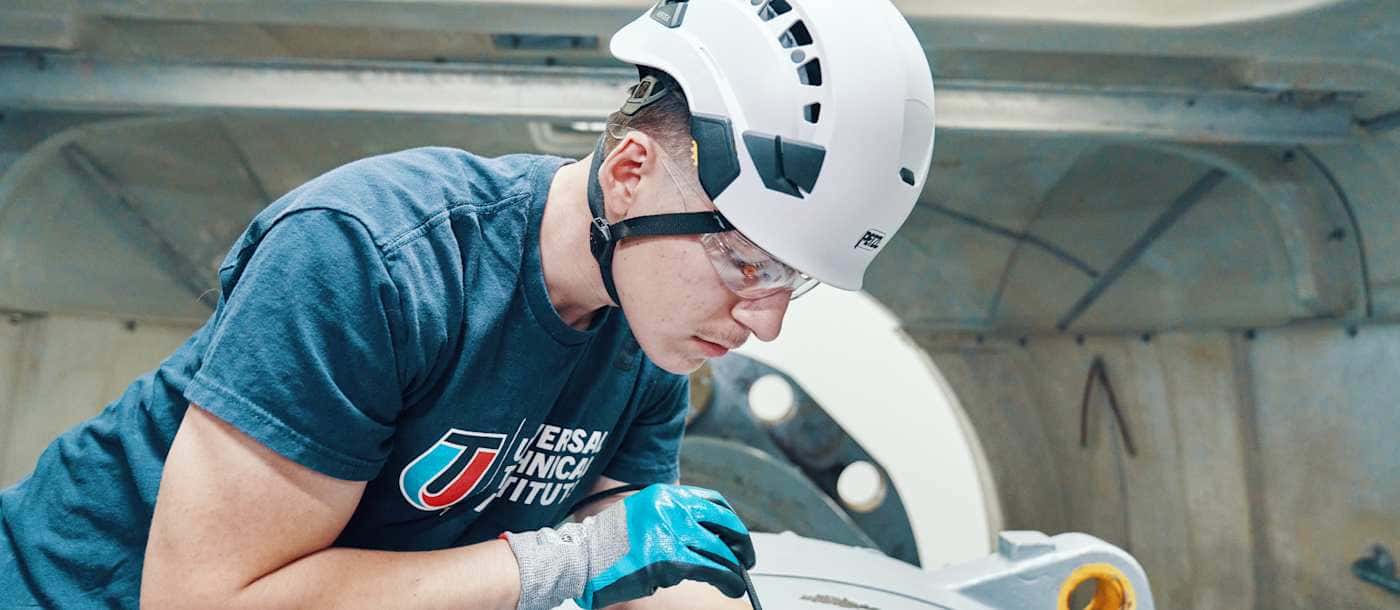More emphasis is being placed on generating energy with cost-efficient, environmentally friendly sources. One of those renewable energy sources is wind, which is an industry in need of technicians to install turbines and keep them running.
Enrolling in Wind Technician Training Classes
There are some eligibility requirements for students applying to the Wind Turbine Technician training program, also known as the Wind Power Technician program at the UTI Canton campus. Students need to supply one of the following:
- Standards-based high school diploma
- State-issued GED certificate or diploma, or state-authorized equivalent exam
- Successful completion of a degree program at the post-secondary level or evidence of having previously attended a Title IV-eligible program
- Completion of an officially recognized home-schooling program
For more information, head here. Talk with an Admissions Representative for more information on all wind technician program requirements.
Wind Turbine Technician Courses
Courses in UTI's Wind Turbine Technician training program include relevant, real-world training with a curriculum developed hand-in-hand with employers.1 Some of the courses that students will take, along with their descriptions, are listed below (course titles and descriptions are subject to change).
Energy Industry Fundamentals
This course reviews the history of the power technology industry through present day and the common terminology and definitions used in the industry. This introductory class alerts students to the many hazards encountered in the production and use of high- and low-voltage electrical equipment. Other topics explored in this class are related to:
- Function of a power plant
- Hydraulics and pneumatics
Safety Compliance
This course reviews the history of the power technology industry through present day and the common terminology and definitions used in the industry. This introductory class will alert students to the many hazards encountered in the production and use of high- and low-voltage electrical equipment. Other topics explored in this class will be related to:
- Lifting and rigging
- Fire prevention
- Lock out tag out
- Confined space and hazmat safety
DC Electrical Theory
In this course, students will learn direct current (DC) electrical theory and applications. This course is designed to teach students electrical circuit schematics and diagrams including charging and storage functions. Students:
- Design, calculate, build and troubleshoot
- Learn about circuit operations and electrical fundamentals
- Utilize proper testing equipment
AC Electrical Theory
In this course, instructors teach students single-phase, alternating current, electrical theory and principles and their application to energy technology and power-generation systems. Students:
- Are taught AC electrical circuit schematics and design
- Demonstrate complete lab projects with the use of schematics
- Troubleshoot electrical faults
Advanced Electrical and Industrial Controls
In this course, students will utilize the prior learning from DC and AC Electrical Theory for advancing their knowledge of more sophisticated electrical circuits and troubleshooting electrical controls like; Programmable Logic Controllers (PLC’s), Variable Frequency Drives (VFD’s) and 3-phase power usage.
Renewable Energy and Control Devices
In this course, students will learn about renewable energy systems. The course provides students with knowledge of renewable energy sources and how they function in the energy industry. Students:
- Demonstrate their acquired knowledge by conducting research projects
- Gain hands-on application with renewable energy systems
- Become familiar with the functions, operations, design, maintenance, troubleshooting and repair of these systems
Wind Turbine Components
Instructors of this course teach about wind turbine power generation and its function in the renewable energy technology industry.. Topics include:
- Fluid types
- System inspection
- Component identification, function, maintenance and repair
Wind Turbine Operations, Climb & Rescue
In this course, students learn operations and design of wind turbines in the energy technology and power-generation industries. With the use of the correct equipment manuals and electrical schematics, students will properly disassemble, test and/or inspect and reassemble wind turbine components and systems crucial to systems operation. They will also be taught:
- Proper torquing procedures
- Identification of and adherence to technical safety procedures
- Hazards involved in working at heights
- The American National Standards Institute (ANSI) and Global Wind Organization (GWO) safety standards and safety regulations relating to safe and accurate climbing and rescue operations
Next Steps After the Program
Students in this program learn the skills they need to feel confident pursuing entry-level positions in the wind industry. Most of our grads start out prepared to work as entry-level technicians or in other entry-level roles. As with any industry, over time, they may be able to advance in their careers with experience and hard work. Some entry-level and advanced roles could include:77
Entry-level
- Wind turbine technician
- Installation technician
- Field service technician
Advanced
- Troubleshooting technician
- LOTO I & II specialist
- Wind farm support specialist
- Electrical engineer
- Environmental engineer
- Materials engineer
For more information on career paths and outlooks in the wind industry, head here.
FREQUENTLY ASKED QUESTIONS
UTI and its family of schools follow a blended-learning format, with in-person, hands-on lab work led by instructors experienced in the industry as well as an online curriculum within the classroom.18
Yes. In order to apply, students must show completion of one of the following: a high school diploma, a GED diploma or certificate or state-equivalent test, an associate's degree, or proof of attending a qualified post-secondary institution or a homeschooling certificate from a qualified program.
Certification requirements vary by employer. For example, some employers might want to see certification under the Global Wind Organization (GWO), OSHA or NFPA 70E. Our program is designed to mirror what the industry requires and teaches the skills today's employers are looking for.
Being a wind turbine technician involves a lot of hands-on work, but can be an exciting career because of its opportunity for travel, problem-solving and adventure, as you are often suspended hundreds of feet in the air in order to perform your tasks. In less than a year, you could be prepared to pursue an entry-level position in the wind industry.

